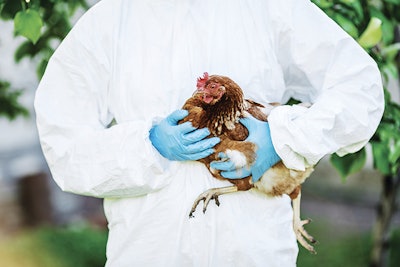
Unlike vaccines, which protect birds against a specific species or even strain of bacteria, antimicrobial peptides (AMPs) could have broad-spectrum activity against diverse microbial pathogens.
AMPs are versatile products that can be formulated as additives in feed or water, topical products and for in ovo injection. Unlike conventional antibiotics, however, AMPs do not trigger resistance to medically important drugs and don’t persist in meat or wastewater, making them a safe alternative to preventing and treating bacterial diseases in the post-antibiotic era.
On November 10, 2021, Inanc Birol, Ph.D., chief scientific officer, Amphoraxe Life Sciences Inc., will talk about AMPs as a replacement for poultry antibiotics during the third webinar in the Poultry Tech Webinar Series.
Synthesis of data and experience improves farm outcomes
Low-cost sensors and internet of things (IoT) technology make it possible to upload data from poultry farms to the cloud where the data can be analyzed. With artificial intelligence (AI) and machine learning, algorithms can be developed to provide feedback to growers and service personnel.
How much better would results be if algorithms were supplemented by 24/7 monitoring data by a human with farm experience?
Russell Jones, commercial development, OPTIfarm, will share how data collection, algorithms and feedback systems can help integrators identify issues and solve problems to improve flock outcomes.
Using machine vision to monitor poultry floor distribution
In commercial bedding floor poultry houses, bird density and distribution pattern are critical factors for evaluating production management and animal health/welfare. Currently, daily routine inspection of broiler flock distribution in commercial grow-out houses is done manually, which is labor intensive and time consuming.
Lilong Chai, Ph.D., assistant professor and poultry engineering specialist, University of Georgia will discuss how machine vision can be used to detect broiler floor distribution patterns, behaviors and welfare patterns of chickens in drinking, feeding and resting/activity zones.
What’s coming next
For more on the technologies set to advance the poultry industry, join industry-changing innovators, researchers, entrepreneurs, technology experts, investors and leading poultry producers at the Poultry Tech Webinar Series, scheduled for November 2, 4, 10, 11, 17, 30 and December 2.
During the webinar series, industry experts will preview what’s coming next – from prospective solutions to developing technology – for the poultry industry.
This webinar series is proudly sponsored by: Arm & Hammer, Aviagen, Baader, Boehringer Ingelheim, Cargill, Ceva, Chore-Time, Cobb, Evonik, Marel, Phibro Animal Health, Staubli, and Zoetis.
Visit our website for more details on the webinar series, topics and speakers.
Register for free today and join us for a glimpse at the future of the poultry industry.


















